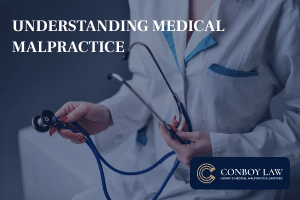







Home » How Do I Know If I Have a Medical Malpractice Case?


Medical malpractice arises when a healthcare professional provides care that does not match the field’s standards, causing harm or injury to a patient. If you believe your doctor made a mistake that caused you harm, you might wonder if you have a case. Knowing whether you have a medical malpractice case involves understanding the legal definition of medical malpractice and identifying if your experience fits within that definition. It’s important to know that not all unsatisfactory medical outcomes are due to malpractice.
At Conboy Law, we believe every medical professional you go to has your best interests at heart. However, mistakes happen, and you should not have to pay the price for those mistakes. That is where medical malpractice lawsuits can help you protect your rights. Our medical malpractice lawyer would be honored to see if you have a valid medical malpractice claim.
Learn more about how to hold medical professionals accountable below. Then, contact us to schedule a free case consultation.
Table of Contents
Toggle
Medical malpractice occurs if a doctor or medical professional does not provide care that matches the industry standard. Then, that substandard care must harm the patient. The standard of care pertains to what a competent healthcare professional in the same field would have done under similar circumstances.
Medical malpractice comes in various shapes and forms. Common examples include errors in diagnosis, medical treatment, aftercare, or health management. Recognizing if your situation falls under one of these categories is the first step in determining if you might have a malpractice case against a medical provider.
Medical negligence becomes malpractice when it causes harm. It’s not enough that a healthcare provider made a mistake; that mistake must result in injury or damage to the patient. For example, if a physician prescribes the wrong medication but no harm is done, it may not constitute malpractice. However, if that wrong medication causes a harmful reaction or worsens the patient’s condition, it could be considered malpractice.
Negligence in a medical setting can stem from failing to do something that should have been done or doing something that should not have been done. This can include misinterpreting test results, not providing the necessary treatment, or providing poor treatment. The key element is that these actions or inactions directly lead to harm or injury that could have been avoided.
For a medical malpractice case to be valid, it must meet four essential criteria: duty of care, breach of duty, causation, and damages. Each of these components is crucial in establishing a healthcare provider’s liability. If one of these elements is missing, it may significantly weaken the case. These criteria form the foundation of any medical malpractice lawsuit.
Duty of care is the legal obligation of healthcare providers, doctors, and physicians to provide care that meets accepted medical standards. This means that when you visit a doctor or hospital, they must treat you with the skill, care, and diligence level that a reasonably competent healthcare provider would under similar circumstances. Establishing this duty is the first step in a medical malpractice case.
A duty breach occurs when a doctor does not meet the standard of care expected of them. This can happen through acts of omission or commission—either by not doing something necessary or by doing something improperly. To prove a breach of duty, it must be shown that the provider’s actions deviated from what is considered acceptable medical practice.
Causation is about linking the breach of duty directly to the harm sustained by the patient. It’s not enough to show that the healthcare provider made a mistake; it must be clear that this mistake was the direct cause of the injury. This often requires showing that the injury would not have taken place if the healthcare provider had followed the standards of the field.
Damages refer to the actual harm or injury suffered by the patient due to the medical professional’s actions or inaction. This can include physical pain, mental anguish, additional medical bills, and lost wages. To pursue a medical malpractice case, there must be clear evidence of these damages and their impact on the patient’s life.

Medical malpractice can manifest in various ways, each with unique implications for the patient’s health and legal options. Recognizing these examples can help you understand if your experience might constitute malpractice.
Misdiagnosis or a delayed diagnosis can contribute to the wrong treatment, delayed care, or no treatment whatsoever, potentially causing harm or worsening the patient’s condition. This can happen when a healthcare provider neglects or misinterprets symptoms or test results. Patients who suffer as a result may have a valid malpractice claim.
Surgical errors often include:
These mistakes can have devastating consequences, including long-term health issues or even death. Such errors are clear examples of medical malpractice.
Treatment errors may involve providing the wrong treatment for a patient’s condition, resulting in harm. This can also include errors in the dosage or type of medication administered. When treatment errors occur, they can delay recovery, cause new health issues, or exacerbate existing conditions, often leading to additional suffering and medical expenses.
Medication mistakes are among the most common forms of medical malpractice. These can include prescribing the wrong medication, incorrect dosage, or failing to recognize harmful drug interactions. Such errors can lead to serious health complications, allergic reactions, or even death.
Complications during pregnancy and childbirth can lead to serious harm to both the mother and baby. Negligence can occur if a healthcare provider fails to recognize or properly address these complications. This can include failure to perform necessary cesarean sections, improper use of birthing tools, or failure to monitor the baby’s condition.
The impact of medical malpractice can extend far beyond physical injuries. It can also lead to major emotional distress, financial strain due to lost wages and medical costs, and a decrease in quality of life. These effects are important considerations in any medical malpractice case.

Medical records are vital in a medical malpractice case. They provide a detailed account of the patient’s treatment and condition. These records can help establish what standard of care was expected and whether there was a deviation that led to harm.
Expert witness testimony is often a key element of a medical malpractice lawsuit. Medical experts can help explain complex medical issues to the court and establish whether the standard of care was met. Their testimony can be crucial in proving both breach of duty and causation.
If you suspect you have been a victim of medical malpractice, seeking legal advice is an essential first step. An experienced medical malpractice attorney should review your case, collect evidence, and walk you through the legal process. They can also provide you with a realistic assessment of your chances for success.

Conboy Law understands the challenges and complexities of medical malpractice cases. With years of experience and a dedicated team, we are committed to fighting for the rights of patients harmed by medical negligence. We believe in holding healthcare providers accountable and securing the compensation you deserve. Contact us today to arrange a free consultation with our office.
Search
If you or a loved one has been injured, don’t hesitate to contact our injury attorneys today!
"*" indicates required fields



60 W Randolph St. 4th
Floor Chicago, IL 60601
Monday to Friday:
Saturday:
Sunday:
Available For Calls
8:00 AM – 8:00 PM
9:00 AM – 5:00 PM
Closed
24/7
Chicago and surrounding areas